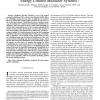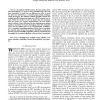67 search results - page 2 / 14 » Channel Access Statistics of Parallel Multiuser Scheduling |
CORR
2010
Springer
13 years 5 months ago
2010
Springer
Multiuser diversity (MUDiv) is one of the central concepts in multiuser (MU) systems. In particular, MUDiv allows for scheduling among users in order to eliminate the negative effe...
WCNC
2010
IEEE
13 years 9 months ago
2010
IEEE
—One way of modelling the wireless channel is in a statistical manner, based on a few parameters describing the characteristics of the environment. In most current wireless chann...
TCOM
2008
13 years 5 months ago
2008
Abstract In multiuser MIMO systems, the base station schedules transmissions to a group of users simultaneously. Since the data transmitted to each user are different, in order to ...
VTC
2006
IEEE
13 years 11 months ago
2006
IEEE
A scheduling scheme for MIMO systems which has the capability of obtaining multiuser diversity gain and controlling the link connection ratio among users simultaneously is proposed...
ICC
2007
IEEE
13 years 11 months ago
2007
IEEE
—Opportunistic scheduling in random beamforming maximizes the sum-rate by allocating resources to the users with the best channel condition, thus leveraging on multiuser diversit...


